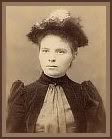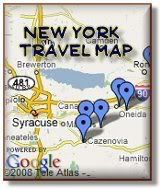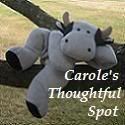We Interrupt This Blog...
Saturday, November 10, 2007
...for a brief ode to one of history's greatest men:
Charles Wesley.
My daughter is playing a Twila Paris CD, and the song playing is Arise, My Soul, Arise, by Charles Wesley. It is perhaps the greatest hymn I have ever heard. Every time I hear it, my heart soars and all cares are left in the dust. What a glorious hymn! Let me quote a few lines: Arise, my soul, arise,
Arise, my soul, arise,
shake off your guilty fears;
The bleeding sacrifice,
in my behalf appears;
Before the throne my Surety stands,
Before the throne my Surety stands,
My name is written on His hands.
My God is reconciled;
His pardoning voice I hear;
He owns me for His child;
I can no longer fear
With confidence I now draw nigh,
With confidence I now draw nigh,
And "Father, Abba, Father," cry.
I adore Wesley's music. You probably know him from Hark! The Herald Angels Sing. He wrote so many wonderful songs: Jesus, Lover of My Soul; O For a Thousand Tongues to Sing; And Can It Be. He wrote about 6,000 other hymns.
Charles and his brother John were born in England in the early 1700s. Their father was an Anglican rector and their mother a devout Christian. From a good source:
He was born on December 18th 1707, the third surviving son and eighteenth child of Samuel and Susanna Wesley. He was not fifteen months old when the old Rectory at Epworth was totally destroyed by fire. Charles, like John, had to be rescued from the inferno. He was hastily carried by a maid and placed safely in his mothers arms. Samuel Wesley's ambition was to make scholars and clergymen of his three sons - the daughters, alas, had lesser prospects and little happiness.
Charles' mother Susanna-- herself the 22nd of 24 children-- educated her children and taught them piety. Although the daughters did not (could not) become scholars, the entire brood was brilliant, knowing Greek, Latin, and Hebrew before age 10.
Brother John grew up to become a minister like his father. Charles was a rambunctious youth who sometimes made trouble.
When [John] tried to restrain the rather careless and fun loving ways of his young brother, Charles resisted with "Would you have me to become a saint all at once?"
Charles was certainly the more emotional and artistic member of the family.
If Charles was no less a scholar than John, he was less calm and collected than his brother, and subject to emotional ups and downs. When he graduated in 1730, father Samuel wrote from Epworth, "You are now fairly launched. Hold up your head and swim like a man."
After John returned for a while to Epworth to assist his father, Charles became deeply exercised about spiritual things. He gathered together some others who shared his new religious seriousness. Thus began the 'Holy Club' in 1729, its members soon to receive the nickname 'Methodists'. While John later became leader of the little group, it was started by Charles. Thus he was properly the 'first Methodist'.
In 1732, George Whitefield of Pembroke College joined the group, and a close bond of friendship developed between himself and Charles Wesley who was now a College tutor. There is no doubt that the Holy Spirit was at work in the lives of these young men.
These three men-- the Wesleys and Whitefield-- sparked nothing short of a revolution in England. Their ministry was initially to the poor and the cast-offs of society. Among the slums of London, they established Bible and reading schools, hospitals, homes for homeless women, and orphanages. They traveled to America and established a colony for poor orphans in Georgia. Whitefield traveled throughout all thirteen colonies, spreading the "new" message of salvation through grace by believing in Jesus Christ and not by man's own efforts to earn God's favor. Their message and devotion to the works of God spread like wildfire.
Their work is considered by historians to have protected England from their own "French Revolution" when the fever hit Europe. It is also known that they helped unite the vastly different American colonies, so that John Adams, reflecting upon the reasons for the quest for American independence said:
The Revolution was effected before the war commenced. The Revolution was in the minds and hearts of the people; a change in their religious sentiments of their duties and obligations.
John Adams was a young man during the "Great Awakening," that period of history of reflection and repentance. Benjamin Franklin, a good friend of George Whitefield, had said of this time:
It was wonderful to see the change soon made in the manners of our inhabitants. From being thoughtless or indifferent about religion, it seem'd as if all the world were growing religious, so that one could not walk thro' the town in an evening without hearing psalms sung in different families of every street.
The Wesleys and their "methodism" of living a life devoted completely to God (holiness) impacted England and America much more than we realize. I adore Charles Wesley's hymns not only because they are so beautiful, but because the message within speaks volumes of both their ministry and God's great gift.
Good post. The Wesley's have familiar names but not familiar lives and writings. I, too, love their hymns.





